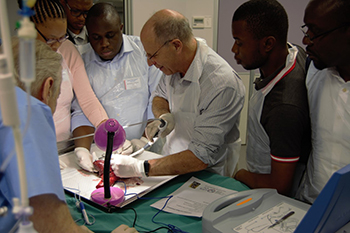Latest News Archive
Please select Category, Year, and then Month to display items
01 February 2024
|
Story Lacea Loader
|
Photo SUPPLIED
 Prof Prince Ngobeni, newly appointed Campus Principal of the UFS Qwaqwa Campus.
Prof Prince Ngobeni, newly appointed Campus Principal of the UFS Qwaqwa Campus.
The University of the Free State (UFS) has appointed Prof Prince Ngobeni as Principal of the Qwaqwa Campus as from 1 February 2024.
Prof Ngobeni completed his first qualification in Analytical Chemistry at the then Technikon North-West before furthering his studies at the then Technikon Pretoria. He completed a DTech in Chemistry at the Tshwane University of Technology (TUT) in 2003. In 2016, he enrolled for a Doctor of Business Administration in Higher Education at the University of Bath in England.
His lecturing career began at TUT in 1995 where he progressed from Head of Department: Chemistry in 2003 to Associate Dean: Faculty of Science in 2010, before being appointed as Executive Dean of the Faculty of Sciences at TUT in 2015 – a position he held until 2023. He also served as Interim Campus Rector of TUT’s Pretoria Campus from 2018 to 2020.
“With extensive years of academic leadership experience, Prof Ngobeni has the experience required to guide the Qwaqwa Campus towards the university’s Vision 130. The campus is already recognised as a leader in some of its unique research fields, and Prof Ngobeni’s strong research background will be valuable in this regard,” says Prof Francis Petersen, Vice-Chancellor and Principal of the UFS.
Prof Ngobeni is a member of several professional bodies in his field of expertise, including MatTEK at the Council for Scientific and Industrial Research (CSIR), the South African Chemical Institute (SACI), the Society for Atomic Spectroscopy, and the South African Council for Natural Scientific Professions (SACNASP). During his career, he has also secured research funding for individual projects and international partnerships. Prof Ngobeni also initiated chemistry practical sessions for local schools and participated in the Technology Station in Chemicals project, which offers a wide range of services designed to assist small and medium enterprises (SMEs) in the chemical sector.
His substantial list of publications in journals and books covers a range of chemistry-related and managerial topics. He is also a well-versed presenter at local and international conferences.
“The Qwaqwa Campus has experienced major developments in recent years; I look forward to further contributing to the growth of the campus and to support the university in achieving its Vision 130,” says Prof Ngobeni.
Great turnout for Hannes Meyer Symposium in Cardiothoracic Surgery
2017-05-05

Symposium attendees watch attentively as
Dr Johan Brink demonstrated a MAZE procedure
with a pig’s heart.
Photo: Supplied
The University of the Free State’s Faculty of Health Sciences hosted the annual Hannes Meyer Symposium in Cardiothoracic Surgery. The symposium was organised by Prof Francis Smit, head of the department of Cardiothoracic Surgery at the UFS, with the support from the Society of Cardiothoracic Surgeons of South Africa and the European Association of Cardiothoracic Surgery (EACTS). Over the past 16 years this symposium has steadily been growing in stature and prestige leading to the resounding success that was this year’s event.
Medical advancements explored
The aim of the symposium is to provide an overview of the latest advances in Cardiothoracic Surgery and perfusion as well as providing hands-on training via simulation to trainees from South Africa and the rest of the African continent. Didactic lectures and papers by registrars were an integral component of the symposium. The South African community was represented by various heads of departments, trainees, senior specialists and perfusionists from all the training centres in the country. There were also delegates representing Uganda, Mozambique, Nigeria and Zambia.
Heart surgery off to new heights
Simulation in Cardiothoracic Surgery and Perfusion can be compared to airline pilots with high risk, with complex surgeries being first done in simulators before being attempted in the real world. The UFS is proud to have a state-of-the-art simulation facility, which was used to facilitate the programme.
The range of simulation was extensive and included simple procedural models to complex full theatre setups with Human Performance Models in perfusion that simulated crisis scenarios with the aid of computerised devices that react in real time to human intervention.
Industry support highly appreciated
This event was coordinated by Dr Jehron Pillay, senior registrar in the Department of Cardiothoracic Surgery and Marilee Janse van Vuuren, deputy-director clinical technology, in the department. This was the first time that such extensive simulation models were used in the programme and judging from the positive response received, it has certainly set the benchmark for all future events.
The event has received invaluable support over the years from EACTS that has selected Bloemfontein as the site of its African training programme as a result of the high level of training and education achieved here.
The academic discussions were chaired by Profs Marko Turina and Jose Pomar (past presidents of EACTS) and Pieter Kappetein (past secretary general of EACTS) who are extremely well known internationally for their contribution to advancing Cardiothoracic training and education.
Our guests from EACTS presented didactical lectures on research methodology, international randomised trials and discussed recent developments and controversies in cardiothoracic surgery.
Registrars from all South African units presented a thoracic and cardiac surgery paper from each unit highlighting specific disease conditions, moderated by heads of departments and the international panel.
An event of this magnitude requires significant financial support and the medical industry in South Africa stepped up to the plate in providing financial and logistical support in order to make it possible.